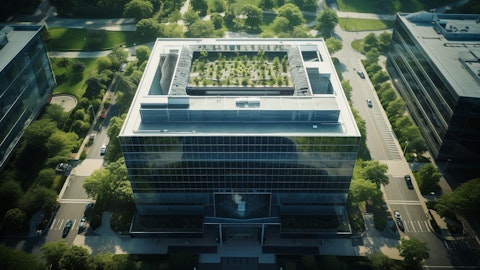BrainsWay Ltd. (NASDAQ:BWAY) Q3 2025 Earnings Call Transcript November 11, 2025
BrainsWay Ltd. misses on earnings expectations. Reported EPS is $0.04 EPS, expectations were $0.11.
Operator: Good day, and welcome to the BrainsWay Third Quarter 2025 Earnings Conference Call. [Operator Instructions] Please note this event is being recorded. I would now like to turn the conference over to Brian Ritchie with LifeSci Advisors. Please go ahead.
Brian Ritchie: Thank you all, and welcome to BrainsWay’s Third Quarter 2025 Earnings Conference Call. With us today are BrainsWay’s Chief Executive Officer, Hadar Levy; and Chief Financial Officer, Ido Marom. The format for today’s call will be a discussion of recent trends and business updates from Hadar and Ido, followed by a detailed discussion of the financials. Then we will open up the call for your questions. Earlier today, BrainsWay released financial results for the 3 months ended September 30, 2025. A copy of the press release is available on the company’s Investor Relations website. Before I turn the call over to Hadar, I would like to remind you that this conference call, including both management’s prepared remarks and the question-and-answer session, may contain projections or other forward-looking statements regarding, among other topics, BrainsWay’s anticipated future operating and financial performance, business plans and prospects and expectations for its products and pipeline, which are all subject to risks and uncertainties, including shifting market conditions resulting from geopolitical, supply chain and other factors as well as the use of non-GAAP financial information.
Additional information regarding these and other risks are available in the company’s earnings release and its other filings with the SEC, including the Risk Factors section contained in BrainsWay’s Form 20-F. Finally, please note that the company’s 6-K will be filed tomorrow at approximately 6:00 a.m. Eastern Time in accordance with the SEC’s operating schedule. I would now like to turn the call over to Hadar.
Hadar Levy: Thank you, Brian. Welcome, everyone, and thank you for joining us today. We are excited to announce record quarterly revenue of $13.5 million reported in the third quarter of 2025. This represents a 29% increase compared with the same period last year. In addition, we shipped a total of 90 Deep TMS systems during the quarter, representing a 43% increase compared to the same period last year. This brings our total installed base to more than 1,600 systems across the globe. With our quarterly results continuing to trend towards the higher end of expectations and improved visibility into the remainder of the year, we are raising the midpoint of our guidance for the full year 2025, including increasing our revenue guidance to a range of $51 million to $52 million, which is up from our previous guidance of $50 million to $52 million.
We now expect to report operating profit in the range of 6% to 7% of revenue, up from the previous guidance of 4% to 5% and adjusted EBITDA in the range of 13% to 14% for the year, up from the previous guidance of 12% to 13%. Let me now take a deeper dive into our performance and why we believe our long-term growth is being built into the current execution of our strategy. As I have mentioned previously, we made the decision approximately 2 years ago to focus our attention on selling to large enterprise customers who value our technology and high level of customer service to support their Deep TMS systems. To this end, we have structured multiyear lease agreement, which in turn provide us a steady foundation from which to grow our business and maintain gross margin every year.
As a result of our team’s dedication to this sales model, we have transitioned the majority of our sales over with approximately 70% of our recent customer engagement being lease agreements. And I want to highlight that the customers are aligned with this type of engagement as we have had a high rate of customer retention with many customers deciding to extend and even expand their agreement out several years. And this outcome really highlights the scalability of our business. And while perhaps the initial focus each quarter is on the revenue numbers, internally, we also find value in looking at our book-to-bill ratio for the quarter, which was 1.3x indicating that bookings were solidly above our billing. And our remaining performance obligation under existing customer agreement was $65 million at the end of the quarter.
These are just a couple of metrics, which we believe reflects a strong market demand momentum and give us confidence in our forward visibility and revenue trajectory. I am proud of how effectively our team has executed our business model to date. Let me take a minute to walk you through our strategy, which includes 3 main key pillars, which we believe are our key to driving long-term growth: one, further elevating market awareness of Deep TMS and its clinical impact; two, advancing our R&D road map to unlock new and expanded treatment indication; and three, broadening patient access through global expansion and health system integration. At the core of these initiatives is our regulatory approvals and clinical data, which continued to set Deep TMS apart and allow us to lead the market.
Most recently, we announced that the U.S. FDA has granted an expansion of the treatment protocol for the Deep TMS system to include an accelerated protocol for major depressive disorder or MDD treatment. As a reminder, the traditional Deep TMS protocol involves a 4-week acute treatment phase with 1 session on each day of treatment. This is compared to an accelerated protocol, which involves a significantly shorter acute phase, taking place over several treatment days. This is a very exciting development for us in the treatment centers using our systems, as we believe the accelerated protocol has the potential to improve convenience and thereby make Deep TMS substantially more appealing to prospective patients. As a reminder, Deep TMS is the only TMS modality cleared by the FDA and with peer-reviewed published clinical evidence for a broad range of indications, including depression, anxious depression, late life depression, OCD and smoking addiction.
We are also supporting the evaluation of accelerated protocol for these other indications. For example, the U.S. NIH recently awarded approximately $2.5 million in 5-year grant for the clinical study evaluating the mechanism of action and potential efficacy of the accelerated Deep TMS protocol to treat alcohol use disorder or AUD. This study will be conducted by research team led by Dr. Claudia Padula and Dr. Michelle Madore of Stanford University and the Palo Alto Veterans Institute of Research. This study, which is posted on clinicaltrial.gov for any of you that would like to review the details, will utilize our novel Deep TMS 360 system, which has been designed to provide more comprehensive and uniform stimulation of the neurons in the targeted brain regions.

The accelerated protocol being evaluated in this study is similar to the accelerated protocol for MDD, including an acute phase taking place over several treatment days as compared to the traditional protocol, which is several weeks. Moving on to our investment initiatives. As previously announced in late 2024, we identified a new opportunity to generate shareholder value by making minority interest investment in mental health providers as well as other enterprises that we believe are complementary to our business. This strategy allows us to tap into the market we know well, building additional market awareness, R&D road map, data analysis capabilities and expanding access to Deep TMS while avoiding stepping into an operational role outside of our core focus of Deep TMS.
To support us in this initiative, Valor Equity Partner made a $20 million strategic equity investment in our company. This investment provided us with the capital needed to quickly move ahead with this strategy on a broader, more meaningful scale. We are pleased with the rollout of this initiative to date, which most recently included our third and fourth investment in 2025. This recent strategic investment have come quickly on the heels of our first 2 agreements with Stella Mental Health and Axis. This collaboration is already making meaningful contribution as utilization of Deep TMS system at those clinics is up over 50% from the start of our relationship. During the third quarter, we also announced an initial strategic investment in Neurolief LTD, a developer of the world’s first wearable noninvasive multichannel brain neuromodulation platform that is designed for use at home.
This agreement includes a milestone-based funding for up to an additional $11 million of convertible loan over 2 tranches, along with an option to fully acquire the company. These strategic investments are an exciting new part of our story, and we look forward to helping each business grow initially through the additional fund the investment provide, but also through strategic counsel as they look to navigate faster and larger growth. We look forward to identifying additional investment, and we’ll keep you updated on these initiatives. This is a truly exciting time in our history as we continue to identify ways to drive long-term shareholder growth. As we just heard, there is significant momentum in all aspects of our business, so much so that it is too much to cover on this call.
Therefore, we will be hosting a virtual Investor and Analyst Day on December 1 to further discuss our operations, clinical, regulatory and financial progress. Additional details will be announced shortly. With that, I will now turn the call over to Ido for his review of our third quarter 2025 financial results. Ido?
Ido Marom: Thank you, Hadar. As Hadar noted, Q3 2025 was another record quarter for BrainsWay with revenue of $13.5 million, representing a 29% increase compared with the $10.5 million reported for the same period last year. During the quarter, we placed 90 Deep TMS systems, bringing our total installed base to more than 1,600 systems as of September 30, 2025. Gross profit for the quarter was $10.2 million, up $2.4 million from $7.7 million in the prior year period, while maintaining a strong gross margin of 75% compared with 74% for the same period last year. This stability continues to reflect the strength of our recurring revenue model and disciplined cost management. Turning to operating expenses. Sales and marketing totaled $4.7 million compared to $4.1 million in Q3 2024, an increase of approximately $0.6 million, driven by targeted investment in commercial expansion and marketing programs.
Research and development expenses were $2.4 million compared to $1.8 million last year, an increase of $0.6 million, primarily from our ongoing clinical trials and development activities. General and administrative expenses were $1.8 million compared to $1.5 million in the prior year period, an increase of $0.3 million due in part to additional legal fees and due diligence costs related to new investments. Operating profit was approximately $1.3 million, which is a $1 million increase compared with the $0.3 million reported for the same period last year. Adjusted EBITDA increased to $2 million from $1.1 million in the prior year period. Net profit for the quarter was $1.6 million compared to $0.7 million in the same period of 2024, demonstrating the operating leverage in our model as we scale.
From a balance sheet perspective, we ended the quarter with $70.7 million in cash and cash equivalents, up $1.1 million from $69.6 million at year-end 2024. This increase was driven primarily by very strong collection during the quarter despite deploying $7.3 million for our minority equity investment as part of our strategic initiative. Remaining performance obligations grew to $65 million, a 37% year-over-year increase, providing strong visibility into future revenues. Cash flow from operations in the quarter was positive, further reinforcing the strength of our recurring model and high collection efficiency. Our capital structure remains debt-free, giving us significant flexibility to pursue strategic growth initiatives, including the investment program Hadar outlined earlier.
As Hadar mentioned, after a strong third quarter and increased visibility for the remainder of the year, we have raised the midpoint of our guidance for the full year 2025, which includes revenue guidance of $51 million to $52 million, up from our previous guidance of $50 million to $52 million. This guidance represents a year-over-year growth rate of 24% to 27%. We also expect operating profit in the range of 6% to 7% of revenue, up from our previous guidance of 4% to 5% and adjusted EBITDA in the range of 13% to 14% for the year, up from our previous guidance of 12% to 13%. The increased operating and adjusted EBITDA margins reflect the increased scale of our operations. This concludes my remarks, and I will now turn the call back to the operator to please open up the call for questions.
Operator?
Q&A Session
Follow Brainsway Ltd. (NASDAQ:BWAY)
Follow Brainsway Ltd. (NASDAQ:BWAY)
Receive real-time insider trading and news alerts
Operator: [Operator Instructions] The first question comes from Jeffrey Cohen with Ladenburg Thalmann.
Jeffrey Cohen: Congrats on the quarter. So I guess, firstly, could you talk about the accelerated protocol and give us some sense of current treatments that are taking on the accelerated protocol and what you may expect over the coming quarters?
Hadar Levy: Yes. I think the accelerated protocol is a really big news for patients around the world that is basically shortening the acute phase protocol from 4 weeks to only 6 days in which we are increasing the dosage, the amount of treatments per day to 5 treatments per day. The demand so far looks pretty good. And I think that, that’s what’s really driving the demand for the growth of the company.
Jeffrey Cohen: Okay. Got it. And then secondly, could you talk about minority equity investments? Congrats on the handful already this year. But what might we expect as far as the pipeline and other investments over the coming quarters?
Hadar Levy: Yes. So we have a full hand of pipeline of this minority investment that we are speaking and exploring the option to collaborate with them. We still need to check the box on part of our due diligence process to make sure that this growing enterprise are growing, they are profitable. They have the right management team and that we believe that they can execute upon their business plan. So the goal before the end of the year is to sign at least one more. And there is a handful of additional opportunities for 2026 that looks very promising.
Jeffrey Cohen: Got it. And then lastly for us, could you give us an update on Neurolief as far as any activity currently going on in Japan and EU and then talk about U.S. timing or anticipated activities here.
Hadar Levy: Yes. I think we’re all anticipating to — for Neurolief to receive the FDA clearance toward the end of the year. We’re hoping there won’t be some additional delay with that, but things might look a little bit slow due to the current situation with the FDA administration. But we’re hoping to get this FDA clearance for the end of the year. Once we get clearance for that, they’re ready to market their — to distribute their device through different channels. It could be VA, it could be IDNs. And obviously, TMS clinics through BrainsWay customers. But the most promising one that we’re waiting for is FDA clearance towards the end of the year.
Operator: The next question comes from Carl Byrnes with Northland Capital Markets.
Carl Byrnes: Congratulations on the quarter. I’m just curious what you’re seeing in terms of system placements from the minority partners thus far. And then again, looking at adding 5 or so partnerships per year, what we should expect potentially in terms of incremental system placements? And then I’ll jump back into the queue.
Hadar Levy: Yes. Each one of these minority investment is providing us with a business plan. And based on their expectation, they are planning to expand and to grow in between to an opening up additional 10 to 15 new clinics every year. Obviously, the first year is always the most challenging one to make sure that they’ve got all the necessary setup. But once they got the funding and they got everything they need, they should deliver on that, either by merger and acquisitions or opening some de novo clinics. So that’s pretty aligned with our expectations. We’re not sharing the data of current installed base that we received from our minority investment, but I can only share with you that aligned with our expectations. I did share a very important fact that with the most early investment that we’ve made with both Stella Mental Health and Axis, both of them grew their utilization rate more than 50% since inception, since the collaboration with us.
And that’s the most important sign. It means that they like the technology, they’re utilizing this technology, and they’re expanding, which is pretty aligned with our expectations.
Operator: [Operator Instructions] The next question comes from Ram Selvaraju with H.C. Wainwright.
Raghuram Selvaraju: Congratulations on the quarter. I wanted to ask about, first of all, how you think you will alter metrics reporting going forward in general, if we can expect greater granularity on, for example, what you expect to be growth in total installed base, what you anticipate to be performance with respect to some of the individual minority investments and so on? And also, I wanted to ask a couple of specific questions about where we are currently. Firstly, if you could elaborate on where you are with respect to the upgrade cycle across the installed base. And how you expect that to play out over the course of the coming quarters, that would be very helpful. And then if you can offer us any granularity regarding the state of the international business and geographically speaking, where you expect the bulk of growth to come from as we look ahead to 2026?
Hadar Levy: Yes. Great. Thank you for the questions, and I’m hoping I won’t forget anything. So in terms of the metrics or KPIs that we are measuring, I think it’s going to be a mix of some very relative KPIs. It will be a number of systems that we are shipping on a quarterly basis, and we can — we see some very consistent growth on that. It will be also the additional indications that we’re also selling on top of the traditional one, it could be the OCD, the H7 or the H4 for addiction. That will be another important KPI, the book-to-bill ratio and most important, again, like is the new initiative with this minority investment that we most probably going to share much more information and trajectory on the Analyst Day meeting on December 1.
So I promise to give you a bit more details about some of those metrics and how you can all try and measure the progress of the company in 2026 and beyond. For your questions about the international growth. So we continue to strength our distribution channels, mainly, mainly, mainly in Asia Pacific and in Europe. So I do expect a very strong trajectory from Japan, China, South Korea, Taiwan, Thailand, all this region and India, of course, all these regions continue to grow their demand and increase awareness in this market, but also in the main countries in Europe, like Germany and France and Spain and Italy, we’re seeing some constant demands in those markets. And last but not least, also the Israeli market is also growing in a very nice way.
So overall, I think that the international growth is pretty aligned with our expectations. I believe there is a chance for us to even expand faster with the additional indication that we currently cleared in those area, which is beyond the mental health, mainly some of them relates to addiction, some of them relates to neurology indications that we’re seeing some good results in these areas. But that’s a very, very promising target, market targets for the company for 2026 and beyond.
Raghuram Selvaraju: And just one other quick one, if I may. Maybe this is more for Ido. Do you have any plans to alter the way in which you report revenue, particularly given the minority stakes that you are acquiring, if you’re going to break out revenue coming from those sources or any other changes that you anticipate with respect to top line item reporting?
Ido Marom: Yes. So those minority investments won’t impact our top line revenue. We are still — need to examine that with our auditors for the financial statements at the end of the year. But right now, those investments will be written either in their fair value or as an equity under the operating profit. So it’s not part of our top line.
Operator: This concludes our question-and-answer session. I would like to turn the conference over to Hadar Levy for any closing remarks.
Hadar Levy: Great. Thank you. I would like to thank all the investors, analysts and other participants for their interest in BrainsWay. With that, please enjoy the rest of your day. Goodbye.
Operator: The conference has now concluded. Thank you for attending today’s presentation. You may now disconnect. Thank you.
Follow Brainsway Ltd. (NASDAQ:BWAY)
Follow Brainsway Ltd. (NASDAQ:BWAY)
Receive real-time insider trading and news alerts




